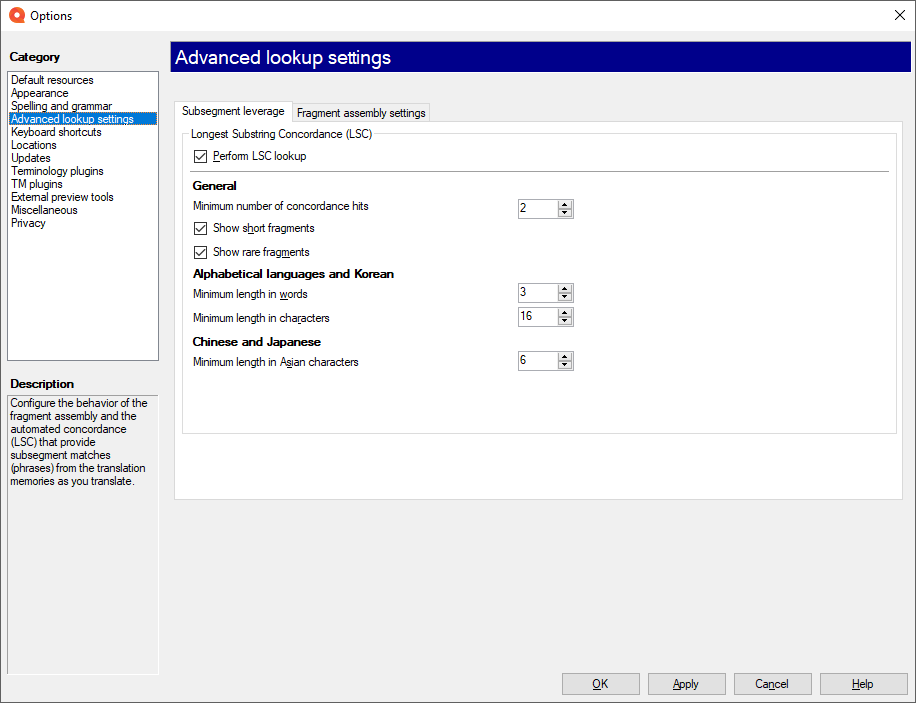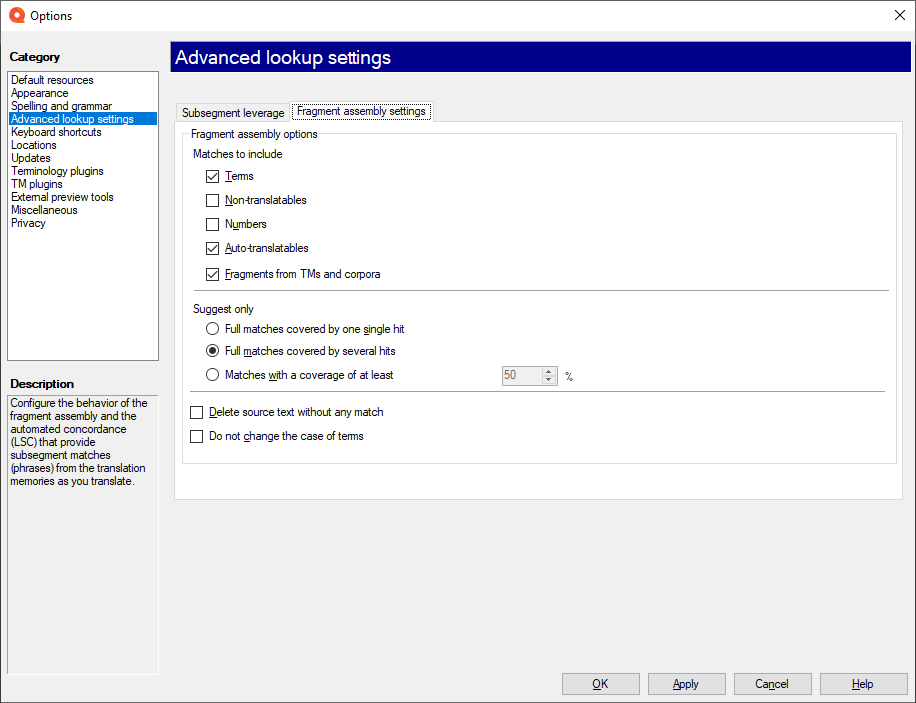Options - Advanced lookup settings
These settings control how memoQ offers suggestions for parts of a segment. When there is no match for the entire source segment - not even a remotely similar one -, memoQ will find some parts of it in the translation memories and in the term bases.
When part of a segment is there in a translation memory - or in a LiveDocs corpus - more than once, memoQ offers that part as a suggestion. If that part is also just a part of another translation memory unit, memoQ will show it in the Concordance window. However, if that part matches an entire unit from the translation memory, memoQ will offer the translation to replace part of the source segment, similarly to term base hits. This is called subsegment leverage or automatic concordance or longest substring concordance (LSC). Longest because memoQ will offer the longest matching unit from the translation memories.
When memoQ finds several parts - fragments - of the source segment in translation memories, LiveDocs corpora, and in term bases, it will replace those fragments with the translations it finds in these resources. The result is a fragment-assembled match, where some parts are replaced with translations, and the rest is kept from the source text.
These two mechanisms offer two types of suggestions: automatic concordance matches and fragment-assembled matches. Normally, automatic concordance matches show up in orange, and fragment-assembled matches appear in purple. To learn more about the types of matches, see Help about the Translation results pane.
How to get here
- Open the Options window: At the very top of the memoQ window - in the Quick Access toolbar
 -, click the Options (cogwheels)
-, click the Options (cogwheels)  icon. The Options window opens.
icon. The Options window opens. - Under Category, click Advanced lookup settings. The Advanced lookup settings pane appears.

What can you do?
Do not change the defaults unless you are entirely certain that you will get better suggestions as a result. If you just tamper with these settings, you may lose productivity. To learn more about these types of suggestions, see Help about the Translation results pane.
To do this, click the Subsegment leverage tab. Here are the available options:
- Perform LSC lookup check box: Normally, memoQ tries to find parts of the current segment in translation memories and in LiveDocs corpora. It is not recommended to turn this off, unless you use the translation memories from a server, and the network connection is slow or limited. To stop looking for parts of the source segments, clear this check box.
General (language-independent) settings:
- Minimum number of concordance hits box: Normally, memoQ gives you a match if a part of a segment occurs twice or more in a translation memory. If this gives you several useless matches, you may make the list more reliable. To do that, enter a larger number in this box.
- Show short fragments check box: If a part of a segment is found as an entire unit in the translation memory, memoQ will display it even if it is shorter than the length specified in Minimum length in words or in Minimum length in characters. If you receive many unnecessary suggestions, you may clear this check box.
- Show rare fragments check box: If a part of a segment is found as an entire unit in the translation memory, memoQ will display it even if it occurs fewer times than specified in Minimum number of concordance hits. If you receive many unnecessary suggestions, you may clear this check box.
Alphabetical languages and Korean: These settings apply for alphabetical languages and Korean (used as the source language).
- Minimum length in words box: Normally, memoQ does not show suggestions for parts that are shorter than 3 words. If you need more matches, enter a lower number here. If you need fewer matches, enter a higher number here.
- Minimum length in characters box: Normally, memoQ does not show suggestions for parts that are shorter than 16 characters. So, a part of a source segment must be at least 3 words or 16 characters long to show up in the automatic concordance matches.
Chinese and Japanese box: This setting applies for the Chinese and Japanese languages (used as the source language).
- Minimum length in Asian characters: Normally, memoQ does not show suggestions for parts that are shorter than 6 Asian characters. If you need more matches, enter a lower number here. If you need fewer matches, enter a higher number here.
To do this, click the Fragment assembly settings tab.

Here are the available options:
Under Matches to include, memoQ shows the potential building blocks of a fragment-assembled match. These are types of matches that memoQ may find for several parts of the source segment. Normally, memoQ uses all of them. You may want to stop using one or another if you get unnecessary or incorrect replacements. To stop using a type of match as a fragment, clear its check box:
- Terms: Replaces terms with translations as fragments.
- Non-translatables: "Replaces" non-translatable items with themselves as fragments (the text will not change, but memoQ will mark the fragment).
- Numbers: Replace numbers with their target-language forms as fragments. Unusual source number formats may result in incorrect replacements. These may also conflict with auto-translation rules. If this happens, clear the Numbers check box.
- Replaces text with results of auto-translation rules as fragments. Sometimes these rules work better on numbers than the Numbers option itself. If this is the case, clear the Numbers check box (not this one!).
- Fragments from TMs and corpora: Replaces text with results from translation memories and LiveDocs corpora as fragments. memoQ will use matches where a part of the source segment is there as an entire unit in the translation memories or in the LiveDocs corpora.
You can also choose when memoQ offers a fragment-assembled match. To do that, use the radio buttons under Suggest only. Normally, memoQ offers a fragment-assembled match if at least half of the source segment can be replaced. Here are the other options:
- Full matches covered by one single hit: Offers a fragment-assembled match only if the entire segment is covered by one fragment. This means that fragment-assembled matches are not offered at all.
- Full matches covered by several hits: Offers a fragment-assembled match only if the entire source segment can be replaced from various hits. This is the same as choosing the Matches with a coverage of at least radio button, and setting the number to 100%.
- Matches with a coverage of at least: Offers a fragment-assembled match if a large-enough portion of the source segment can be replaced. Normally, this is set to 50%. To get more but less useful matches, enter a lower number here. To get fewer but more useful matches, enter a higher number here.
Normally, memoQ will keep the text that is not replaced. To omit the text that would remain in the source language, check the Delete source text without any match check box. This is not recommended.
Normally, memoQ will change the case (lowercase and uppercase letters) of terms to the case of the fragment that is replaced. To keep the case of terms from the term base, check the Do not change the case of terms check box.
If there are several overlapping matches for the same part of the source segment, memoQ uses the match that starts earlier in the segment.
Replaces whole words, does not change endings: memoQ will always look for and replace entire words. If a term is found but with a different ending, memoQ will replace the term from the termbase, but it will not change the ending - you will need to do that to match the target language.
Works from Pre-translate, too: When memoQ pre-translates segments, it will insert fragment-assembled matches, unless you turn this off. You can change these settings from the Pre-translate window, too: click Fragment assembly settings there.
When you finish
To save the settings and return to memoQ: Click OK.
To save the settings and remain in the Options window: Click Apply.
To return to memoQ without making changes: Click Cancel.
- Default resources: Choose default resources (segmentation rules, QA settings, ignore lists etc.) for new projects. Do not mix these with resources in project templates. If you create a project from a template, memoQ will use the settings from the template, and not from these options.
- Appearance: Font and color settings for the translation editor and the Translation results pane. Use this to make the translation editor more readable.
- Spelling and grammar: Open this to set up the spell checker. Choose to use Word or Hunspell. If you choose Hunspell, you can download and install new dictionaries. Set up the spell checker for every target language you work with.
- Advanced lookup settings: Choose how memoQ should offer automatic concordance results, and how it should put together suggestions from fragments (shorter translation memory units and terms). Do not change the defaults unless you are entirely certain that you will get better suggestions as a result. If you just tamper with these settings, you may lose productivity. To learn more about these types of suggestions, see Help about the Translation results pane.
- Keyboard shortcuts: Choose or edit keyboard shortcuts for frequent commands in memoQ. Do not change these before you learn to use memoQ thoroughly. After you change keyboard shortcuts, the Help pages may not help you find them.
- Locations: Check or change the locations of memoQ folders. These are the folders where memoQ places local projects and checked-out copies of online projects, translation memories, term bases, and others. You may need to change these if you are running low on disk space on your default drive. Do not change them unless it is absolutely necessary. Do not place them on network drives. If you place these folders in synchronized locations (local copies of Dropbox, Onedrive etc.), memoQ may become slower.
- Updates: Choose how memoQ should check for updates.
- Terminology plugins: Set up external terminology resources. memoQ can connect to various external terminology providers.
- TM plugins: Set up access to external translation memory services.
- External preview tools: Manage preview tools that are not built into memoQ, but installed separately.
- Miscellaneous: Configure various settings that control how memoQ's editing interface works.
- Privacy: Learn about memoQ's privacy policy, and enable or disable anonymous usage data sharing with memoQ's designers and developers.